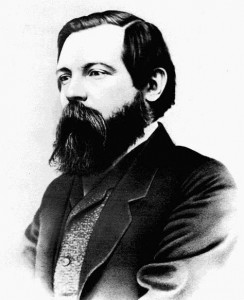by: Friedrich Engels.
ABOUT THE AUTHOR:
(28 November 1820 – 5 August 1895) was a German social scientist, author, political theorist, philosopher, and father of Marxist theory, alongside Karl Marx. In 1845 he published The condition of Working Class in England, based on personal observations and research. In 1848 he co-authored The Communist Manifesto with Karl Marx, and later he supported Marx financially to do research and write Das Kapital. After Marx’s death, Engels edited the second and third volumes. Additionally, Engels organized Marx’s notes on the “Theories of Surplus Value” and this was later published as the “fourth volume” of Capital. He has also made important contributions to family economics.
” THE GREAT TOWNS” SUMMARY:
In the chapter “The Great Towns”, Engels struggles to analyze under what conditions the people of working class in England of 1840s make a living in the urban district of Manchester. The method the author employs while carrying out his study appears to be peripatetic in the sense that he strives to reveal the horrors of industrial urbanism by merely walking around. While conducting a tour in various neighborhoods of proletarian Manchester, he explicitly points out his observations of appalling living conditions of the working class so that he renders his assertions reasonable. According to Engels, there was a connection between the physical decrepitude of the urban infrastructure and the alienation and despair of the urban poor. Hence, in The Great Towns, he stresses the ‘degradation’ of the working class with regard to the “hypocritical town planning” in the city of Manchester. From Engels’ perspective, the lack of city planning especially in the great cities under the force of capitalism was organized in such a way that would properly serve the interests of the advantageous class, that is to say the bourgeoisie. Even after his death in 1895, this view has been the prevailing one among the academic milieu. As a consequence, many scholars have attempted to clarify the inner-city development, which was an issue first coined in and identified by Engels.
In The Great Towns, Engels first introduces to the reader the “tacit agreement” which organizes the streets in order to keep each person on his own side of the pavement. This way, he argues, no one delays the opposing streams of the crowd. For Engels, this tacit agreement ultimately isolates the individual in his private interest, in some cases making him become even offensive. Engels indicates that this isolation of the individual, this narrow self-seeking constitute the fundamental principle of society. From Engels’ point of view, this isolation brings about the “social war” that is the war of each against all. One might refer to this social war as a corollary of the capitalist system because in this war people regard each other as only useful subjects. In this regard, they exploit each other and in the end the stronger acquires for himself a better position.
REFERENCES:
http://en.wikipedia.org/wiki/Friedrich_Engels
http://faculty.wwu.edu/zaferan/472%20engles%20article.pdf
http://ydemokrat.blogspot.com/2010/12/friedrich-engels-condition-of-working.html
published by:
Fatima Rashid AlNuaimi

